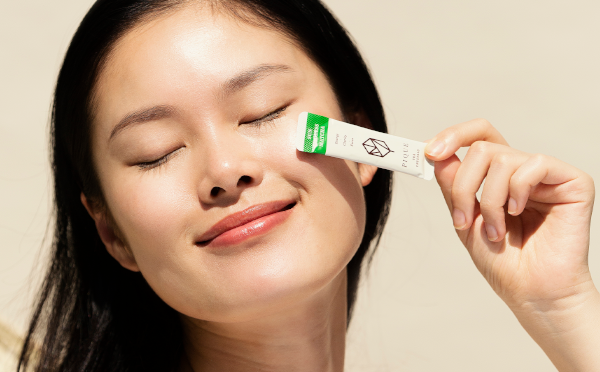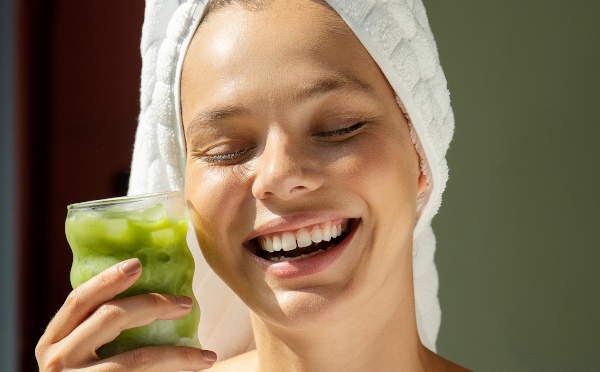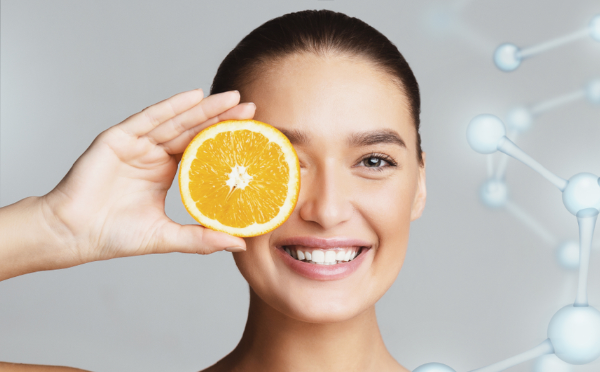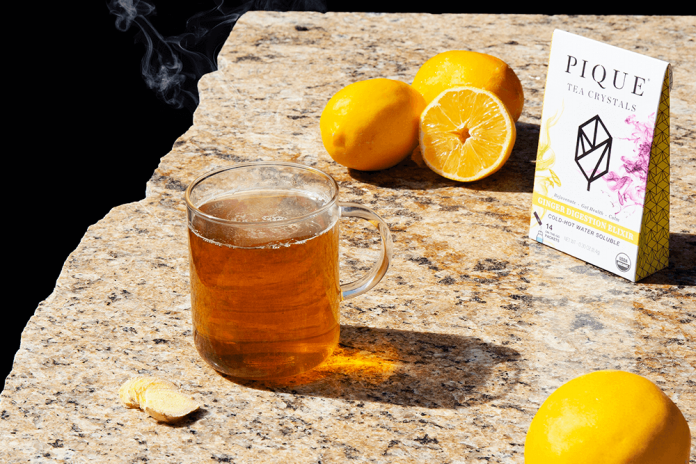Research shows that a whole-foods, plant-based diet can actually help our bodies slow down the aging process.
Specifically, when you follow a diet that emphasizes fruits, vegetables, whole grains, nuts, seeds, legumes, and healthy fats, you’re getting a variety of vitamins, minerals, phytonutrients, and antioxidants. These all help to nourish our cells and protect them from oxidative stress.
This protection has benefits for so many aspects of health. But today, we’re focusing on the benefits of matcha for the biggest organ in the body — the skin.
Specifically, how a boost of antioxidants from matcha green tea powder can support a clear, smooth, and healthy complexion. [1]
What is Matcha?
Matcha is a green tea powder made from the leaves of the Camellia Sinensis plant. It is a staple in Japanese tea drinking culture and is revered for its many health benefits.
Plants destined for matcha are grown in the shade, which inhibits photosynthesis and causes the leaves to produce more chlorophyll, the compounds responsible for matcha’s vibrant green color. Once harvested, the green tea leaves are dried and ground into a fine powder.
The key difference between matcha and green tea is that when you make a matcha drink, you’re consuming the entire leaf, not just its infusion in hot water. This is why the antioxidant content of matcha is so much higher compared to other teas — at least three times higher than the concentration of antioxidants found in green tea. [2]
Does Matcha Improve Skin?
The antioxidants and plant compound in matcha powder work in several ways to help protect our skin and keep pores clear. Here are just a few:
1. Chlorophyll Protects Against UV Rays
In plants, chlorophyll’s job is to absorb rays from the sun and convert that energy into nutrients. It serves the same purpose when applied to skin — absorbing damaging UV rays so our epidermis doesn’t. [3] Mitigating UV exposure has some serious anti-aging benefits.
Over time, too much sun exposure can accelerate photoaging — premature aging of the skin caused by repeated exposure to ultraviolet radiation, which degrades cells’ DNA. Photoaging shows up in the form of dark spots and wrinkles.
The high chlorophyll content of matcha green tea can help to keep skin healthy and looking younger for longer.
2. EGCG Fights Acne at the Source
Studies have shown that applying a mask or other topical solutions containing epigallocatechin gallate (EGCG) helps to reduce sebum production and inhibit the growth of bacteria, and calm inflammation — all factors that contribute to acne.
Sebum is a mixture of fatty acids excreted by glands in the skin. Sometimes the skin makes too much as a response to excessive dryness or environmental irritants, or due to hormonal imbalance. The bacteria Propionibacterium acnes (P. acnes) can proliferate more easily on oily skin, clogging pores and leading to inflammation.
A powerful antioxidant, EGCG helps skin cells fend off the damage done by environmental pollutants and stems the inflammatory process, leading to less irritated skin and lower sebum production. It also has antibacterial effects, which help to control the growth of P. acnes.
When ingested, the EGCG in matcha may also help to reduce the effects of hormonal imbalance by binding with androgen receptors. [4] Androgens are hormones that, if produced in large amounts, can cause the skin to excrete more sebum. Testosterone is one example of an androgen. By binding with androgen receptors, EGCG can blunt androgen activity and curb oily skin.
In one study, researchers found that non-inflammatory acne was reduced by 79% and inflammatory acne was reduced by 89% after participants applied a 1% EGCG topical cream twice daily for eight weeks. [5]
3. Polyphenols’ Anti-Inflammatory Properties Control Redness
ECGC is just one of the many catechins and polyphenols present in matcha. Cumulatively, all of these plant compounds help to calm inflammation throughout the body through their antioxidant powers. By scavenging free radicals — the metabolic byproducts of harmful chemicals and pollutants — polyphenols protect cells from damage. In doing so, they reduce inflammation.
Inflammation is what happens when our cells are trying to fight off an attack. Whether it’s an illness or injury, inflammation is generally a sign that our bodies are trying to overcome or repair a problem and get us back in balance. Antioxidant polyphenols help to neutralize the problem so cells don’t have to fight so hard.
In terms of skin health, reduced inflammation means less redness, clearer pores, and a brighter complexion. The effects are even more pronounced when matcha powder is applied directly to the skin. [6]
4. Methylxanthines Promote Blood Flow
Methylxanthines are compounds that help to widen blood vessels, improving blood flow to extremities and the surface of the skin. Caffeine, theobromine, and theophylline are all examples of methylxanthines found in green tea. [7]
Better blood flow has a few benefits. For one, it helps to deliver nutrients and oxygen carried in the bloodstream to skin cells. It also helps to carry away waste products. The result is visibly brighter, glowing skin. Improved circulation can also support faster healing of any cuts or scrapes.

How to Make a Matcha Face Mask
While matcha delivers a powerful antioxidant boost in drink form, the fastest way to reap its skin health benefits is by using the powder to make a face mask.
Opt for high-quality, ceremonial grade matcha over culinary grade if you can, as this version is usually of higher quality. A variety of ingredients can be used to transform your powder into a paste. Manuka honey, aloe vera gel, and coconut oil are all great options with skin health benefits of their own.
Start with a few tablespoons of matcha powder and gradually add in your ingredient of choice until you get a smooth but spreadable consistency. Using clean hands, apply the paste to your skin and let it hang out for about 15 minutes. Then rinse gently with warm water and pat dry with a clean towel.
Another major advantage of DIY matcha masks is they don’t contain the questionable chemicals used in many skincare products to create specific colors, scents or consistencies. It’s an all-natural way to improve skin’s appearance and texture with minimal risks.
What Happens When You Drink Matcha Every Day?
Masks give skin a quick hit of antioxidants, but drinking matcha regularly can help to support healthy skin from the inside out.
Keep in mind, though, that matcha contains more caffeine than regular green tea, so if you’re sensitive, you may not want to exceed two cups per day or drink matcha later in the afternoon, which could disrupt your natural circadian rhythm and make it harder to fall asleep.
The Takeaway
The high concentration of antioxidants and anti-inflammatory polyphenols in matcha green tea can help to minimize oily skin, fight acne-causing bacteria, protect skin from UV damage, boost blood flow and produce a glowing complexion.
DIY matcha face masks are a great way to deliver all these benefits directly to your skin, but drinking a daily cup of matcha or matcha latte won’t hurt either!





